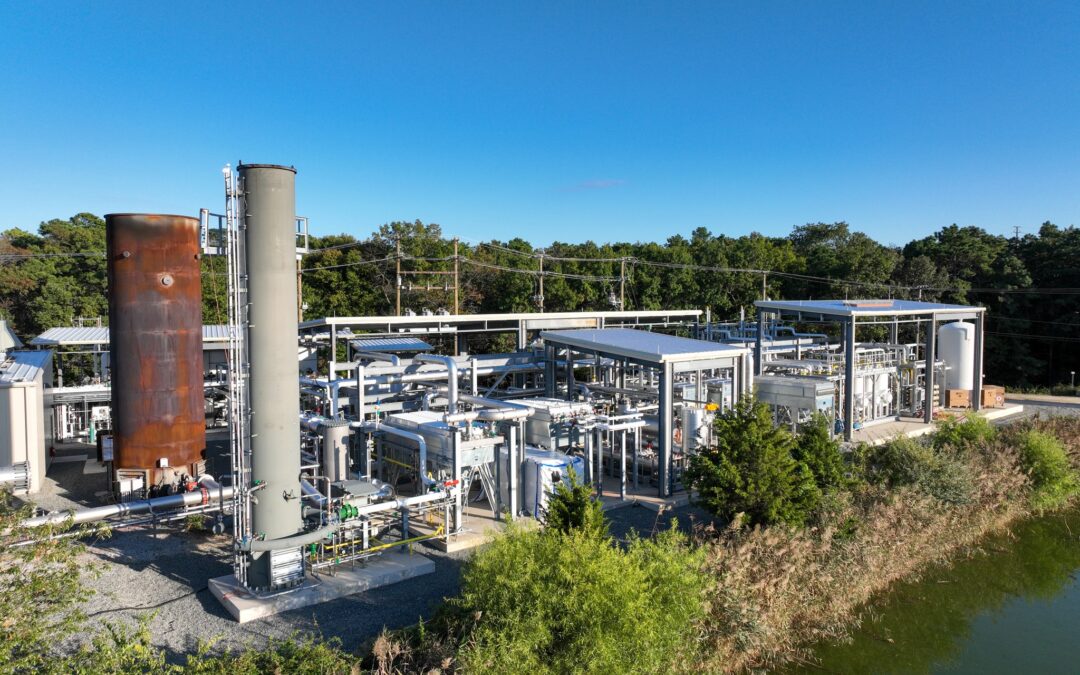A renewable natural gas (RNG) facility is now officially operating at the ACUA’s Egg Harbor Township landfill.
On Oct. 6, OPAL Fuels, South Jersey Industries (SJI) and the Atlantic County Utilities Authority (ACUA) launched a project that captures emissions at ACUA’s landfill and converts them to natural gas.
SJI is an energy company that provides services through its two main subsidiaries — SJI Utilities and SJI Energy Enterprises Group. OPAL Fuels captures biogas and turns it into clean renewable natural gas and electricity.
This facility is the first project to supply renewable natural gas directly into the South Jersey Gas pipeline network, part of South Jersey Industries.
Its operation relies on converting naturally occurring landfill emissions into a usable resource.
As organic waste in landfills begins to decompose, it generates gases such as methane and carbon dioxide. At the RNG facility, instead of releasing these gases into the atmosphere, they are collected through a network of gas wells. The captured gas then undergoes a cleaning process to remove impurities like hydrogen sulfide, according to the ACUA.
The result is renewable natural gas, a carbon-neutral energy source that can be used just like traditional natural gas. Through the existing South Jersey Gas infrastructure, RNG can heat homes and businesses or fuel compressed natural gas (CNG) stations — including the one that powers ACUA’s collection vehicle fleet.
“ACUA is proud to continue its long history of innovation by becoming the first public solid waste facility in New Jersey to host an RNG project,” said ACUA President Matthew DeNafo in the Oct. 6 statement. “Because of the shared environmental leadership among OPAL, SJI and ACUA, landfill gas is now a renewable energy source for our community.”
The facility can process 2,500 standard cubic feet per minute (SCFM) of landfill gas and is expected to produce enough renewable natural gas each year to equal more than 4.6 million gallons of gasoline.
With this project, ACUA becomes the first public solid waste facility in New Jersey to operate a renewable natural gas system. A second facility is planned in Florence Township’s Burlington site as part of the same partnership.
According to the ACUA, landfill gases currently make up 6.1% of New Jersey’s greenhouse gas emissions. Methane, in particular, has a strong impact on climate change. Capturing this methane and converting it into renewable natural gas prevents it from entering the atmosphere and significantly reduces emissions. Using RNG as fuel will reduce greenhouse gas emissions, compared to diesel.
“The launch of this facility marks an important milestone in OPAL Fuels’ mission of turning waste into clean, domestic energy,” said Adam Comora, co-chief executive officer of OPAL Fuels, in the statement. “This project reduces emissions, improves local air quality, creates jobs, and strengthens American energy independence. As we drive forward with a focus on strategic growth and operational excellence, this project serves as an example of how every landfill can benefit from producing RNG by generating financial value, cutting methane emissions, and displacing diesel to decarbonize transportation.”
Julia is a recent Rider University graduate, where she studied multiplatform journalism and social media strategies. In her spare time, she enjoys reading, trying new coffee shops, photography and the beach. She can be reached at juliatrainmedia@gmail.com or connect with her on Instagram @juliatrain
















